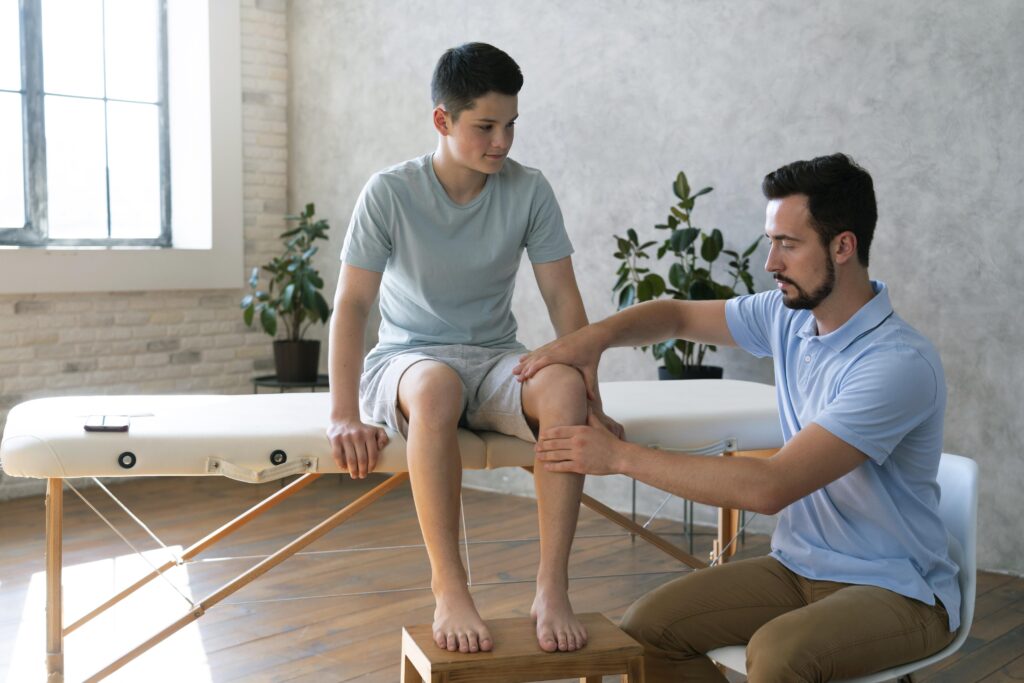Pediatric physiotherapy is a specialized branch of physical therapy that focuses on providing comprehensive care to children with physical challenges. It aims to improve their mobility, strength, flexibility, and overall quality of life. This form of therapy utilizes evidence-based techniques and tailored interventions to meet the unique needs of children and help them achieve their developmental milestones. Continue reading the blog to understand the significance of pediatric physiotherapy, particularly in Bangalore, and how it has been instrumental in transforming the lives of children through specialized care.
Understanding Pediatric Physiotherapy
Pediatric physiotherapy, also known as pediatric physical therapy, involves the evaluation, diagnosis, and treatment of infants, toddlers, children, and adolescents who have movement difficulties or physical impairments. The specialized care provided by pediatric physiotherapists is transforming lives through specialized care for children with conditions such as cerebral palsy, spina bifida, muscular dystrophy, developmental delays, and various orthopedic and neurological disorders. Pediatric physiotherapists employ a variety of techniques to address specific issues, including therapeutic exercises, balance training, gait training, motor learning, and sensory integration. By focusing on these specialized interventions, pediatric physiotherapists can help children overcome limitations, improve their mobility, and enhance their overall physical abilities.
Goals of Pediatric Physiotherapy
The goals of pediatric physiotherapy encompass a wide range of objectives aimed at improving the overall well-being and functional abilities of children with physical challenges. Here are some key goals of pediatric physical therapy:
- Improve Mobility: One of the primary goals of pediatric physiotherapy is to enhance a child’s mobility. This involves improving their ability to move, walk, run, climb stairs, and perform various activities of daily living independently and efficiently. Physiotherapists employ exercises, gait training, and assistive devices to promote optimal mobility.
- Enhance Strength and Endurance: Pediatric physio focuses on strengthening the muscles and improving endurance to facilitate better control of movements and prevent fatigue. Through targeted exercises and therapeutic activities, physiotherapists help children develop the necessary strength and endurance to engage in physical activities with ease.
- Promote Flexibility and Range of Motion: Physiotherapy interventions aiming to improve flexibility and range of motion in children with physical challenges are the major importance of specialized physiotherapy for children. Stretching exercises, joint mobilization techniques, and positioning strategies are utilized to increase joint mobility, prevent contractures, and maintain or improve flexibility.
- Improve Motor Skills and Coordination: Pediatric physiotherapy plays a crucial role in enhancing motor skills and coordination in children. Physiotherapists design interventions that focus on balance training, coordination exercises, and motor learning strategies to improve overall motor development and functional abilities.
- Manage Pain and Discomfort: Children with physical challenges often experience pain and discomfort due to their condition or related complications. Pediatric physiotherapists employ techniques such as heat therapy, manual therapy, and relaxation exercises to alleviate pain, reduce discomfort, and enhance overall well-being.
- Facilitate Independence: Pediatric physiotherapy aims to promote independence in children by helping them gain functional abilities and skills necessary for everyday activities. Physiotherapists work on tasks such as dressing, bathing, feeding, and self-care, enabling children to become more self-reliant and participate actively in their daily lives.
- Enhance Social Integration and Participation: Pediatric rehabilitation therapy focuses not only on physical outcomes but also on improving social integration and participation for children. By enhancing their physical abilities, physiotherapy interventions enable children to engage in social activities, play with peers, and participate in sports and recreational pursuits, fostering social connections and inclusion.
- Prevent Secondary Complications: Children with physical challenges may be at risk of developing secondary complications such as contractures, muscle imbalances, and postural abnormalities. Pediatric physiotherapists employ preventive strategies, including positioning, orthotics, and therapeutic exercises, to minimize the risk of such complications and optimize long-term health.

Who Needs Pediatric Physiotherapy?
Pediatric physiotherapy provides specialized care for children with physical challenges, developmental delays, or neurological and orthopedic conditions. Here are some examples of who can benefit from pediatric physio:
- Cerebral Palsy: Cerebral palsy is a neurological disorder that affects movement and posture. Physiotherapy helps improve motor skills, muscle tone, coordination, and balance in children with cerebral palsy, enabling them to better navigate their environment and engage in daily activities.
- Developmental Delays: Children who experience delays in reaching their motor milestones can greatly benefit from pediatric physiotherapy. Physiotherapists work on promoting age-appropriate motor development, improving muscle strength, coordination, and balance, and facilitating the acquisition of functional skills.
- Muscular Dystrophy: A muscular dystrophy is a group of genetic disorders characterized by progressive muscle weakness and degeneration. Pediatric physio focuses on preserving muscle function, maintaining range of motion, managing contractures, and optimizing mobility to enhance a child’s independence and quality of life.
- Spina Bifida: Spina bifida is a congenital condition affecting the spinal cord and vertebral column. Pediatric physiotherapy helps manage mobility challenges, improve lower limb strength and function, address gait abnormalities, and prevent secondary complications associated with spina bifida.
- Orthopedic Conditions: Pediatric physiotherapy is valuable for children with orthopedic conditions such as fractures, sports injuries, scoliosis, or limb deformities. Physiotherapists employ specific exercises, manual therapy, and orthotic interventions to promote healing, restore function, and optimize recovery.
- Neurological Disorders: Pediatric physio is beneficial for children with various neurological conditions, including autism spectrum disorder, Down syndrome, and brain injuries. It helps improve motor skills, sensory integration, coordination, balance, and overall physical abilities, facilitating participation in daily activities and promoting independence.
Conclusion
Pediatric physiotherapy is a specialized form of care that has a transformative impact on the lives of children with physical challenges. All the above-listed advantages clearly indicates how pediatric physio improves quality of life for children facing any of the challenges through tailored interventions, specialized rehabilitation programs, and a holistic approach to therapy. Pediatric physiotherapy in Bangalore and around the world is improving the mobility, functional abilities, and overall quality of life of children.
Frequently Asked Questions
- What is pediatric physiotherapy and how does it transform lives?
Pediatric physiotherapy is specialized care for children with physical challenges, improving mobility, function, and overall quality of life.
- What are the common conditions treated with pediatric physiotherapy?
Common conditions treated with pediatric physiotherapy include cerebral palsy, developmental delays, muscular dystrophy, spina bifida, and orthopedic conditions.
- Are there any risks or side effects associated with pediatric physiotherapy?
Pediatric physiotherapy is generally safe, but some potential risks or side effects may include temporary muscle soreness, fatigue, or discomfort during exercises.
- Can pediatric physiotherapy improve gross motor skills in children?
Yes, pediatric physiotherapy can improve gross motor skills in children by targeting specific areas of weakness and providing tailored interventions.
- Are there specialized techniques used in pediatric physiotherapy?
Yes, pediatric physiotherapy utilizes specialized techniques such as play-based therapy, sensory integration, gait training, and motor learning approaches.
We are India’s first comprehensive continuum care provider. We provide multidisciplinary out of hospital care to acute and post-acute and chronically ill patients at our critical care facilities and your home.


